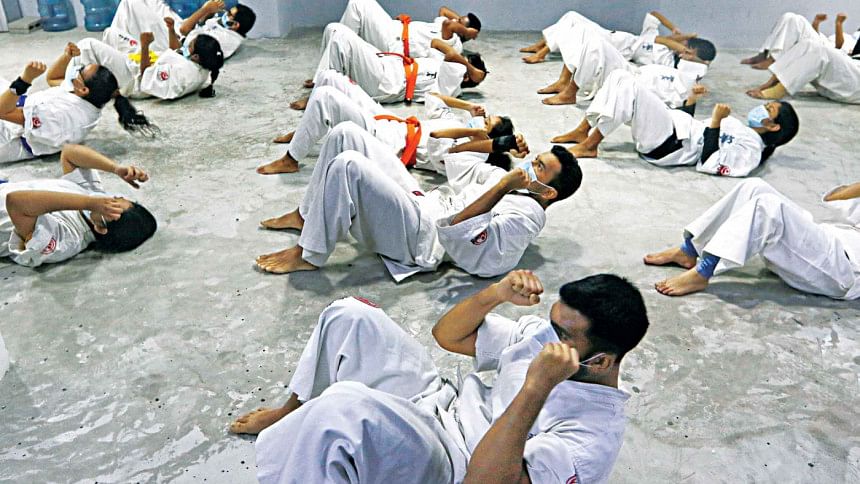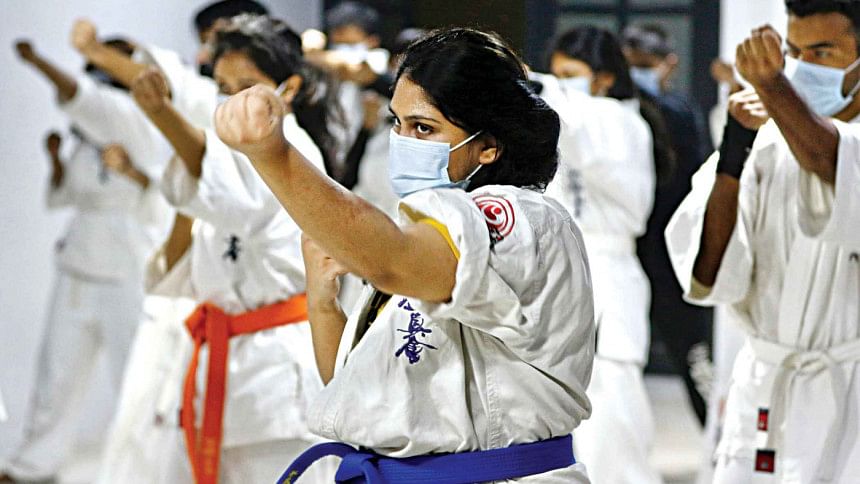Courage, confidence and communal harmony

The origin of martial arts dates back centuries to its birth in China, later merging towards all of Asia under the guidance of Indian Monk Ta Mo in early 500 AD. Over the years, it has become a popular sport among the youth in Bangladesh and beyond.
While many pursue it professionally, others practice it as a lifestyle, regardless of their gender, economic solvency or cultural barriers. Apart from its appearance in sports, martial arts also offers a wide range of benefits for personality grooming and mental health.
According to Shihan Abdullah Mohammad Hossain, Founder and Owner of KO Fight Studio, students of martial arts develop several qualities which contribute to their personal, professional and academic life. "All our students have to take the oath on "Osu'' which means 'yes'. It develops a positive mindset in them," he says. "When they come to the dojo (a hall where martial arts are practiced), they come prepared to hit and be hit. This enhances their endurance, and makes them more prompt and responsive."
Alongside being a strong contributor to building physical resistance, martial arts increases one's focus. "The training makes people more disciplined, and helps to reduce stress," he adds.

Mixed martial arts, a blend of karate, boxing and wrestling among other traditional forms, demands a lot of hard work. "Focusing on one particular form provides people with a lifelong return. For instance, the training in Shinkyokushinkai Karate is arranged for students to reach target levels systemically," says businessman Aseif Masood, a black belt (2nd Dan) in Shinkyokushinkai Karate, who also volunteers as an instructor. "Discipline and strategies such as breaking down complicated movements with strikes, feints and blocks into smaller parts allows students to master them quickly. These strategies are applicable to other aspects of students' professional or academic life as well, as they enhance one's problem-solving skills."
Practicing martial arts not only contributes to body building and skill development, but also helps build communal harmony among students. "Students become part of a community, where their confidence is boosted through rigorous training, competitions and friendships with people from various backgrounds and age groups, making them more accepting of new cultures and perceptions," adds Aseif.
Martial arts is a common hobby for fitness lovers, and it prevails as a motivational factor for many. "I started Kyokushinkai Karate because I felt unhealthy and wanted to be fitter and stronger," shares Siaam Ibn Ali, a Computer Science and Engineering student at North South University, who had to stop his training in 2016 due to family issues. "I returned to the dojo with Shinkyokushinkai Karate in 2019. I had gained a lot of weight during the break, but within just a few months, I started regaining my fitness and got better. I have been training since then and now, I am a black belt (1st Dan)."
Siaam wants to become a professional fighter, and has bounced back in full swing. "For me, it is more about passion than just being fit. I wish to push myself even further to become a champion someday. I feel motivated by videos of other athletes who do exercises like one hand pull-ups and handstand clap push-ups, and other martial artists showing splendid moves. No matter how much I improve, I aspire to keep going," he asserts.
Martial arts help to gain ground for many, especially women, when it comes to self-defense. "I usually train girls in rural areas, where women are often victims of sexual harassment, stalking and domestic violence, under project Oporajita, initiated by Lal Sabuj Society. When the girls reach the training ground, I find them anxious and fearful of revolting against gender discriminatory crimes and offenses," mentions Ayesha Siddika, a national and international Black Belt in Taekwondo, who currently serves as the assistant instructor and executive member at Bangladesh International Taekwondo Association. "However, with time, they become not only physically stronger, but also more confident, which equips them with the voice to fight against such offensive actions."
Being involved in intensive research, Ayesha says that over 80 percent of her students from these training camps only come to her because they want to become brave. She once came across a student who was a victim of domestic abuse, and had only joined the class because she wanted to regain her courage, as she could not tolerate her circumstances any longer. "This has forced me to think about the necessity of this sport, and arrange training sessions countrywide, especially for girls," adds Ayesha, who is also the Founder President of Bangladesh Beach Tennis Association.

People in different office jobs are also significantly interested in martial arts. "I always wanted to learn martial arts as a child, but could not pursue it as I had to focus on my academics. However, when I started working, I was bored with the professional monotony and wanted to pursue my passion," says Hasnahena Lucky, a social and market researcher who is also a yellow belt in Shinkyokushinkai Karate. "Practicing karate has not only made me more confident as a person but it has also made me very patient, and improved my concentration. It has helped me to reduce stress, and improve my performance at work."
The benefits of pursuing martial arts are endless, whether one takes it up as a hobby, a necessity, or a profession. Feeling confident in their ability to defend and protect themselves with the skill set acquired through this sport can empower people to live with less fear and more freedom.
The author is a Trainee Reporter, Arts & Entertainment, The Daily Star. [email protected]
The photographer is a staff photojournalist at The Daily Star. [email protected]

 For all latest news, follow The Daily Star's Google News channel.
For all latest news, follow The Daily Star's Google News channel. 



Comments